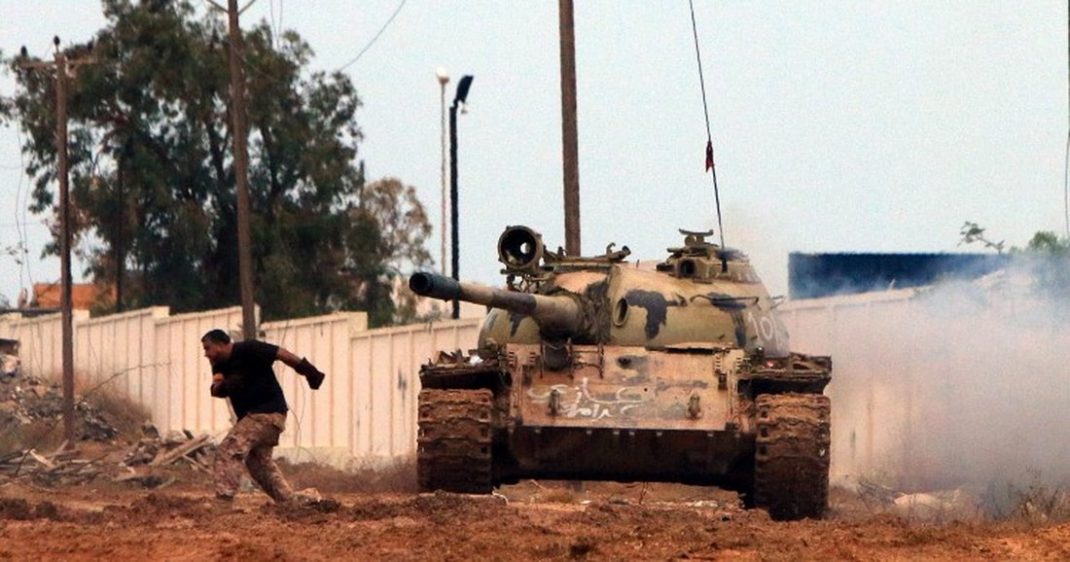By Jonathan M. Winer
 In the 42 years preceding the 2011 uprising, Gaddafi controlled all power in Libya. Since the uprising, Libyans, fragmented by geography, tribe, ideology, and history, have resisted having anyone, foreigner or Libyan, telling them what to do.
In the 42 years preceding the 2011 uprising, Gaddafi controlled all power in Libya. Since the uprising, Libyans, fragmented by geography, tribe, ideology, and history, have resisted having anyone, foreigner or Libyan, telling them what to do.
PART THREE
UNDERLYING CONDITIONS FUELING CONFLICTS
After four decades of highly personalized, centralized rule under Gaddafi and given a near total lack of developed national partisan, Libya was undoubtedly unpromising ground in which to sow a democratic revolution, even though this was almost certainly the desire and aim of most Libyans when Gaddafi was overthrown.
Initially the Libyan revolution resulted in the distribution of armaments widely throughout the country as militias raided military depots.
Afterwards, these self-selected militias all received continuing cash payments from the state as revolutionary thuar. The Libyan army under Gaddafi had never had very strong leaders because he had ensured no one became powerful enough to challenge him.
Once the security apparatus was destroyed by the revolution and NATO bombing, instead of having a unified coercive force subservient to the will of a dictator, Libya’s post-revolutionary security institutions were fractured along local, tribal, ideological, partisan, personal, and regional lines.
Libya’s politicians were ill-equipped to govern, let alone lead. Its transitional political institutions struggled to do their work amid competing theories of legitimacy with no simple means to resolve them.
As late as 2014, the judicial system was generally respected, as demonstrated when Libyans honored the ruling of the Supreme Court on the selection of a prime minister from two candidates nominated by competing governments. But increasingly, court decisions, too, were ignored by the losers.
The big prize of Libya’s oil wealth became increasingly contested, as different groups began to use their control of oil (from oil fields to pipelines to terminals) as a weapon to extort funds. This tactic had the predictable result of reducing oil production, in the process, slowly and then more rapidly, consuming Libya’s national wealth and beggaring the country.
PRECIPITATING EVENTS LEADING TO OPEN CONFLICT
Over the course of 2014, there were a series of provocations by competing interests in the west and the east.
First, on February 14, General Hifter, recalling Gaddafi’s own 1969 coup, announced on TV that he had taken control of Libya’s main institutions that morning, and was suspending the GNC, the government, and the Constitutional Declaration in the name of the people.
In response, the government ordered his arrest, which was as chimerical as his coup.
In May, General Hifter initiated Operation Dignity to reclaim Benghazi from Islamist forces, which in turn prompted the creation of Operation Dawn by those forces and others in the west to oppose him.
In June 2014, after elections were held, the new HoR made the fateful decision not to convene in Benghazi as had been agreed but instead to move further east to Tobruk.
That decision ruptured any sense of unity among Libyans in the west, prompting its predecessor, the GNC, to unilaterally decide to ignore the elections and declare it was still Libya’s legitimate parliament.
Over the duration of 2014, conditions further deteriorated, leading to the period of two ineffective and minimally legitimate governments. Each claimed to control all of Libya, but in practice held little territory.
Meanwhile, military forces aligned with each competed on the ground for control of Benghazi and a limited number of other areas.
During this disastrous period, Libya’s historical grievances became current ones. East-west divisions intensified; oil production rapidly dropped, creating massive deficits that ate away at Libya’s national savings; and space became increasingly ungoverned.
Following fighting between Zintanis and Misratans, among others in Tripoli, and growing violence and criminality, the U.S. and most other international embassies quit the country entirely by mid-summer.
Regional actors doubled down on support for their clients, providing funding, weapons, and in some cases overt military support. For example, Sudan, seeing an opportunity, sold Soviet-era Russian weapons to both sides, with funds and facilitation coming, respectively, from the Saudi-Emirati-Egyptian camp on one side, and the Turkey-Qatar camp on the other.
As the UN SRSG and UNSMIL sought to find a path to initiate talks, the country moved toward a low-intensity, but potentially broadening civil war.
MITIGATING FACTORS
Yet even amidst the crisis of two governments in 2014, beyond Benghazi, Libya did not descend into widespread civil war or anarchy. A number of mitigating factors came into play that helped stabilize the country even as it was largely ungoverned.
The most important included the decision by the Central Bank to continue to pay all the salaries that had been established following the 2011 revolution. This had ensured continued payments to a wide range of constituencies, including militias now fighting one another in Benghazi.
These payments helped to maintain a foundation of a welfare state even under the terrible conditions of 2014, making it less of an economically-driven existential battle.
Other factors included minimal sectarian differences within Libya. Almost all Libyans are Sunni Muslims of the Maliki school of jurisprudence. The country has little tradition of sustained Libyan-on-Libyan violence, with 2011 being the exception, not the norm.
The entire country retains a national interest in continued oil production, due to the geographic spread of its oil reserves and infrastructure from interior to coasts, making all mutual hostages and no one in a position to capture it all.
Libya’s licit economy is almost entirely based on oil production, and oil has been, and for the foreseeable future will remain, its only significant revenue source. This reality requires its problems to be addressed nationally and inclusively, as any division of Libya would be inherently incomplete, unstable, and incompatible with maintaining even a minimally functioning state.
Most Libyans appear to believe conflict is in neither their local nor the national interest.
By 2015, regional actors recognized that they had enough to deal with in Syria, Iraq, and Yemen without adding an unstable Libya to the mix. Western actors realized that they had a real stake in stabilizing Libya to counter the growing flow of migrants through Libya to Europe, and in preventing it from becoming a safe haven for terrorists who would export terrorism elsewhere.
Indeed, within Libya, an additional and often under appreciated restraint on intra-Libyan warfare was the ugly presence of ISIS, which by 2015 had taken over the coastal city of Sirte and a substantial crescent to its south, as well as the eastern city of Derna.
To cite the famous adage of British writer Samuel Johnson, “the prospect of a hanging concentrates the mind.”
Libyans and foreign actors alike saw the beheadings of Egyptian Copts by ISIS, terrorist attacks on tourists in Tunisia carried out from safe havens in Libya, and a lethal assault on one of Tripoli’s major international hotels, and concluded that geographic control of any portion of Libya by ISIS was not something that any of them could tolerate.
Ironically, ISIS’s presence in Libya proved to be a major mitigating factor that enabled international actors to bury their differences and work in common to promote a national Libyan Political Agreement (LPA), as was eventually reached in December 2015 in Skhirat, Morocco, with the help of essentially every regional and international actor with any relationship to Libya.
THE SKHIRAT PROCESS LEADING TO THE LPA
UNSMIL began its work after the revolution with the goal of helping Libya through its transitional period from post-conflict to a permanent government. It simultaneously had reconstruction, humanitarian, human rights, security, and political missions under UN Security Council Resolution (UNSCR) 2009, enacted in September 2011.
Over the course of the two-year tenure of its second leader, Tarek Mitri, from 2012-2014, UNSMIL’s mission narrowed in practice to aiming to resolve the political crisis, eventually stalling out amid Libyan boycotts and the June 2014 Tripoli-Tobruk split into
divided governments.
Mitri’s successor, Spanish diplomat Bernardino Leon, appointed in September 2014, focused his efforts on forging a political agreement to create a new transitional government to replace the two competitors (Tripoli and Tobruk) that had emerged by June 2014, and thereby to curtail the civil war that had developed over the course of 2014.
Over a period of 15 months, he picked representatives from a range of Libyan groups to join what he called the Political Dialogue. He assembled relevant international actors, including both neighbors and Western countries, and overcame recurrent Libyan boycotts.
Through a round-robin of meetings in Algiers, Berlin, Cairo, Geneva, London, Paris, Rome, and Tunis, among other locations, as well as interminable iterations in Skhirat, Morocco paid for by the Moroccan government, Leon was able to create a framework which became the LPA.
The agreement was signed at Skhirat in December 2015 a few weeks after his departure and replacement by German diplomat Martin Kobler. Notably, the LPA depended entirely on securing the full alignment of major international actors.
Egypt, the UAE, Saudi Arabia, Qatar, and Turkey all contributed to getting reluctant and oft-truculent Libyan clients to participate in the talks.
Among the greatest difficulties in achieving international alignment was the conviction by Egypt and the UAE that the Qataris and the Turks were providing arms to the “Islamists,” and the “Muslim Brotherhood,” and the equal conviction of the latter that Egypt and the UAEs were providing them to General Hifter and the “Gaddafites.”
Russia, despite complaining about NATO’s role in having removed Gaddafi in the first place, also supported Leon’s activities. China did the same without reservation. Everyone involved also agreed to cease supplying funds and weapons to their clients, pulling them back from using force to change geographic areas of control.
…
continues in Part 4
***
Jonathan M. Winer has been the United States Special Envoy for Libya, the deputy assistant secretary of state for international law enforcement, and counsel to United States Senator John Kerry. He has written and lectured widely on U.S. Middle East policy, counter-terrorism, international money laundering, illicit networks, corruption, and U.S.-Russia issues.
______________
Middle East Institute




